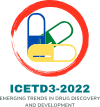Speaker
Description
A thiazolidinedione (TZD), also known as a glitazone, is a five-membered carbon ring molecule commonly used to treat Type 2 diabetes and insulin resistance. There have also been numerous prospective studies that have confirmed these compounds’ anti-proliferative efficacy, despite side effects such as hepatotoxicity, water retention, and cardiac complications. We have synthesized 12 new TZD analogs where the N-heterocyclic ring is directly connected to the thiazolidinone moiety to reduce their toxic properties. By adopting a widely applicable synthetic method, eleven TZD derivatives were synthesized and tested for their antiproliferative activity in MTT and assessed for their in-vitro cytotoxicity potential against selected human cancer cell lines, namely PC-3, A549, and MCF-7 (breast cancer) cells. Among this new series, compound 19e was found to exhibit a promising cytotoxic effect against the triple-negative breast cancer cell line (MDA-MB-231) with an IC$_{50}$ value of 0.97±0.13 μM. Decreased cellular viability and migration, as revealed by Western blot analysis, part of this antiproliferative effect was supported by apoptosis studies evaluating BCL-xL and C-PARP protein expression. Our data highlight the promising potential of these TZD derivatives as antiproliferative agents for the treatment of prostate and breast cancer. A series of new β-carboline- hybrids have been synthesized and assessed for their in vitro cytotoxicity potential against selected human cancer cell lines, namely PC-3, A549, MG-63, HCT-15, MDA-MB231, A431, and PANC-1, along with a normal human cell line (L-132). Among this new series, compound 19e was found to exhibit a promising cytotoxic effect.
